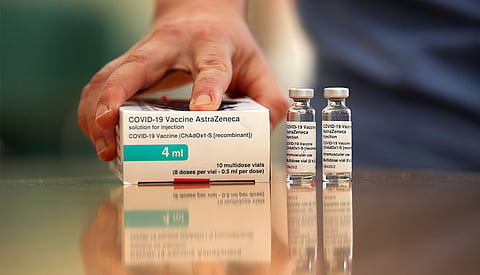

“The Oxford/AstraZeneca vaccine is safe, effective and has already saved thousands of lives,” a UK government spokesperson said.
“When people are called forward, they should get their jab. Vaccines are the best way out of this pandemic and provide strong protection against Covid-19,” the spokesperson said.
This reiterated message came in the wake of the UK and European health regulatory releasing the latest data from their rolling reviews of the vaccination programmes across several countries. The UK’s Medicines and Healthcare products Regulatory Agency (MHRA) recommended age restrictions on the vaccines after its routine monitoring concluded a "strong possibility” that the AstraZeneca vaccine caused blood clots in an extremely small number of cases.
“The MHRA’s scientific review of UK reports of extremely rare and unlikely to occur specific blood clots with lowered platelets has concluded that the evidence of a link with Covid-19 Vaccine AstraZeneca is stronger but more work is still needed,” it said.
The MHRA review found that by the end of March, 79 people in the UK had suffered rare blood clots after the jabs – 19 of whom died. According to official statistics, by the end of March 20.2 million doses of the Oxford/AstraZeneca vaccine against Covid-19 had been given in the UK – this puts the overall risk of the blood clot cases at approximately four people in a million who receive the vaccine.
“This risk, based on reports up to and including 31 March, is slightly higher than the risk calculated from the reports published up to and including 24 March. However, likelihood of these blood clots occurring is still extremely rare,” the MHRA concluded.
As the balance of risk is in favour for older people, the advice would be for younger people to be offered alternatives by the National Health Service (NHS) – either the Pfizer/BioNTech and Moderna vaccines.
The Joint Committee on Vaccination and Immunisation (JCVI) have accordingly published updated guidelines to say that it is “preferable” for adults aged below 30 years to be offered an alternative Covid-19 vaccine, if available.
England's Deputy Chief Medical Officer, Professor Jonathan Van-Tam, described the latest developments as a "course correction", which is not unusual in vaccination programmes.
MORE LIKE THIS…
The conclusions of the MHRA came alongside those from the European Medicines Agency (EMA) in Amsterdam, which also revealed similar findings and said that the overall “benefit-risk” remains positive for the Oxford/AstraZeneca jabs.
“EMA’s safety committee has concluded that unusual blood clots with low blood platelets should be listed as very rare side effects of Vaxzevria (Oxford/AstraZeneca vaccine),” the EMA said.
“People who have received the vaccine should seek medical assistance immediately if they develop symptoms of this combination of blood clots and low blood platelets,” it said.
The EMA said one plausible explanation for the combination of blood clots and low blood platelets is an immune response, leading to a condition similar to one seen sometimes in patients treated with heparin (heparin induced thrombocytopenia, HIT). It has issued new studies and amendments to ongoing ones to provide more information on this.
The advice for anyone who has received the Oxford/AstraZeneca vaccine and is displaying certain symptoms after four days or more is to contact their GP. These rare symptoms include severe headache, blurred vision, chest pain, leg swelling, shortness of breath, persistent abdominal pain or unusual bruising.
The advice for anyone who experiences blood clots and low levels of platelets after their first dose is that they should not have a second dose.